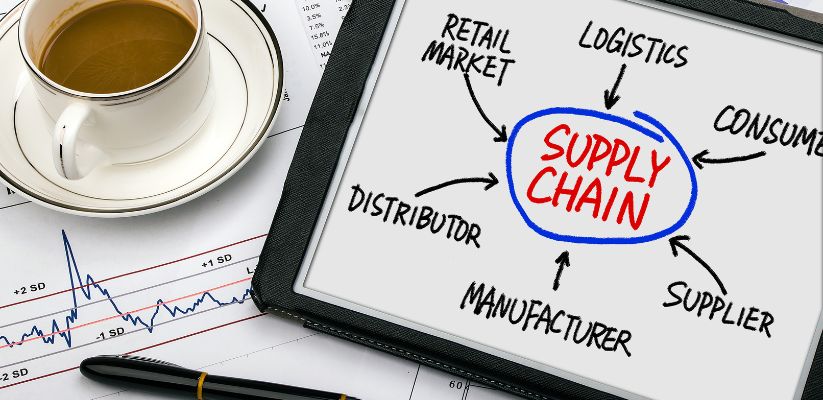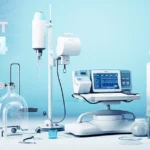How can ERP manage Supply Chain for Pharma Industry?
The supply chain for the pharmaceutical industry is a complex system involving many players. The supply chain begins with the manufacturers who produce the drugs. The drugs are then shipped to distributors, who distribute them to pharmacies and hospitals. Finally, the drugs are sold to consumers.
Each player in the pharmaceutical supply chains has a different role and plays an important part in ensuring that the drugs are delivered to the correct destination. The manufacturers are responsible for producing the drugs and ensuring that they meet quality standards.
The distributors are responsible for shipping the drugs to the correct locations and coordinating with the manufacturers, pharmacies, and hospitals. The pharmacies and hospitals are responsible for stocking the drugs and dispensing them to consumers.
Effective supply chain management is a critical part of the pharmaceutical industry and must operate smoothly in order to ensure that the drugs are delivered to consumers.
Any disruption in the supply chain can cause a shortage of drugs and inconvenience for consumers.
Therefore, the different players in the supply chain must work together to ensure that the drugs are delivered on time and in the correct quantities.
<<Also Read: Benefits of Supply Chain Management>>
What are the critical components of the supply chain model?
The suppliers, manufacturers, distributors, and retailers are critical components of the supply chain. The suppliers provide the raw materials or components to the manufacturers.
The manufacturers produce the products and may also distribute them to the distributors. The distributors may sell the products to retailers or to other distributors. The retailers sell the products to the consumers.
How does the pharmaceutical supply chain work?
The supply chain is the process through which a company acquires goods and services. The pharmaceutical supply chain management begins with identifying a need or opportunity and ends with delivering a product or service to the customer.
In between, the supply chain includes the planning and procurement of materials, the production of goods or services, and the distribution and delivery of those goods or services to customers.
The Challenges of the Pharma Supply Chain
The pharma supply chain is a complex and challenging endeavour, with many different components that must work together to ensure that patients receive their needed medications.
There are many different stakeholders in the pharma supply chain, each with its own interests and concerns.
The manufacturers of pharmaceuticals need to ensure that they have enough inventory to meet demand, but they also need to ensure that they are not overproducing and storing unnecessary inventory.
They also need to ensure that their products meet quality standards.
Pharmaceutical distributors need to ensure that they are getting products to the right places in a timely manner. They also need to be aware of any shortages or recalls that may occur.
The pharmacies and hospitals that dispense pharmaceuticals need to ensure that they are getting the correct medications and that they are being stored and dispensed correctly. They also need to be aware of any recalls that may occur.
Patients who rely on pharmaceutical supply chain network for their health need to be able to trust that the medications they are taking are safe and effective. They also need to be able to access the medications they need.
From all these challenges mentioned above, It is clear that the pharma supply chain is a complex and challenging endeavour. It is essential that all of the stakeholders work together to ensure that patients receive the medications they need.
<<Also Read: What is Supply Chain Management (SCM) in ERP?>>
The impact of the pharma drug supply chain on the industry
The pharma supply chain has a significant impact on the industry. It affects the pricing of drugs, the availability of drugs, and the quality of drugs. The supply chain also affects the research and development process for new drugs.
Strategies for overcoming the challenges of the Pharma Supply Chain Management
Pharma companies are constantly looking for new ways to improve the efficiency and reliability of their supply chains. However, despite their best efforts, there are always going to be some challenges that are difficult to overcome. Here are three strategies that can help to overcome some of the common challenges in the pharmaceutical supply chain.
a. Develop a comprehensive plan and stick to it.
A well-developed plan is essential for success in any supply chain. However, it is especially important in the pharma industry, where disruptions can have serious consequences. A comprehensive plan should include a detailed strategy for dealing with potential disruptions and contingency plans for when things go wrong. It is also essential to stick to the plan as much as possible so that everyone in the supply chain is aware of what is expected of them.
b. Improve communication and collaboration
The pharma supply chain is a complex web of suppliers, manufacturers, and distributors. To ensure that the chain runs smoothly, it is essential to have good communication and collaboration between all the players. This means sharing information openly and quickly and working together to resolve any issues that arise.
c. Use technology to improve efficiency
Technology can play a crucial role in improving the efficiency of the pharma supply chain. Tools like track and trace software can help to ensure that products are tracked and monitored throughout the supply chain. This can help to detect and prevent any issues that may arise. In addition, technology can help to improve collaboration between suppliers and optimize the distribution process.
<<Also Read: What are the main Features of Supply Chain Management?>>
How can the pharmaceutical supply chain models be improved?
The pharmaceutical supply chain is a complex system that involves many different stakeholders. In order to improve the system, it is important to understand the challenges that stakeholders face.
Pharmaceutical manufacturers need to have reliable and timely access to ingredients and components in order to produce products. They also need to be able to distribute products to pharmacies and hospitals in a timely manner.
Pharmacies and hospitals need to have reliable and timely access to pharmaceutical products. They also need to be able to order products from manufacturers and receive them in a timely manner.
The pharmaceutical supply chain can be improved by addressing the challenges faced by stakeholders. Manufacturers can improve their supply chains by ensuring that they have reliable access to ingredients and components. Pharmacies and hospitals can improve their supply chains by ensuring that they have reliable access to pharmaceutical products.
The pharmaceutical supply chain is a vital part of the industry and must be able to handle the complex and global nature of the sector. It is crucial to have a robust and reliable supply chain in order to ensure that the products reach consumers safely and on time.
ERP software is essential for successful supply chain management in the pharmaceutical industry. By tracking inventory and managing supply chain operations, ERP systems can help ensure that products are delivered on time and within budget.
<<Also Read: Explained: Logistics vs Supply Chain>>
How can ERP benefit the pharmaceutical industry?
ERP software is a comprehensive software system that integrates all aspects of a business, from accounting and HR to production and sales. Pharmaceutical companies can benefit from ERP in a number of ways, including:
• Improved visibility and control over operations. With all data centralized in one system, pharmacy benefit managers have a real-time view of all operations, allowing them to make better decisions and respond more quickly to changes in the market.
• More efficient and accurate reporting. ERP systems compile data from all departments into standardized reports, making it easier to track performance and identify areas for improvement.
• Increased efficiency and accuracy in production. ERP system can automate many production processes, reducing the need for manual intervention and ensuring that products are made to the correct specifications.
• Improved customer service. By integrating sales and marketing data with customer relationship management (CRM) software, ERP application can provide sales and customer service representatives with instant access to the latest information about customer orders, preferences, and history.
How can ERP supply chain management help improve operations in the pharmaceutical industry?
Supply chain management (SCM) is the process of managing the flow of goods and materials through the supply chain. It includes the planning, organizing, and controlling of the activities and resources involved in the supply chain.
SCM can help improve operations in the pharmaceutical industry by helping to manage inventory, improve communication and coordination between departments, and reduce waste and inefficiencies.
<<Also Read: What is a Sustainable Supply Chain? | Green Supply Chain operations>>
How can ERP help manage and optimize the supply chain for the pharmaceutical industry?
Pharmaceutical companies today are looking for ways to improve the efficiency and effectiveness of their supply chains. ERP can help by providing a single system that can manage and optimize the flow of goods and materials through the supply chain. This can help to improve inventory management, reduce lead times, and improve customer service.
Wrapping Up
ERP for supply chain management in the pharmaceutical industry has many benefits. One of the most important benefits is that it can help to improve inventory management. In addition, it can help to improve communication within the supply chain, reduce costs, and improve customer service.
ERP systems can help pharmaceutical companies to streamline their operations and improve their supply chain management. This can result in improved efficiency and reduced costs, making ERP systems a valuable tool for any company operating in the pharmaceutical industry and the supply chain partners.
Sage Software Solutions is a leading IT company with an array of advanced ERP Software solutions. Our proprietary products — Sage X3 and Sage 300 will help you cut your operational expenses, improve business productivity, increase operational efficiency, forge robust customer relationships, and strengthen association with vendors, suppliers, and distributors. So, if you are looking to reinforce your business fundamentals and emerge as an industry leader, then please schedule a call with one of our sales representatives.





